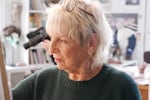The Ashland Independent Film Festival is one of Oregon’s biggest events for filmmakers. Most years, an estimated 5,000 people from around the country come to Ashland for five days in April, to share their love of independent cinema.
But this year, because of the restrictions on public gatherings due to COVID-19, organizers had to think of a new way to present the festival.
Richard Herskowitz, AIFF’s artistic and executive director, said the organization agreed it needed to take the festival online.
“We had already for several weeks been looking at online possibilities to recreate the festival virtually, to not lose what we had spent the whole year creating and not have to disappoint all those filmmakers whose films we had accepted,” he said.
But Herskowitz wasn't sure was how financially viable an online festival would be.
“The biggest challenge at the beginning was how to give our members and our sponsors a feeling of value to what we could offer them through our virtual festival, that would be equivalent to what they had paid for through their membership,” he said.

Actor Bruce Campbell hosted the Ashland Independent Film Festival Awards Night with director Luz Carasa. Due to restrictions on public gatherings, AIFF shifted the festival to a virtual format.
Courtesy Richard Herskowitz
Moving AIFF online came with a lot of format changes. Instead of five days, it was now three weeks, and the festival moved, running from mid-May to early June.
AIFF partnered with Film Festival Flix, a company specializing in creating virtual film festivals, to showcase 29 selected movies. Each film would play for 24 hours, and after viewing, attendees could interact with the filmmakers in a special Facebook group.
“Wednesdays were films about the arts, Thursdays were films about migrations, Tuesdays were films about Asian Americans,” Herskowitz said.
Even though the films were online, Herskowitz wanted to preserve the atmosphere of the festival as much as he could through discussions and forums.
“We have what we call a 'virtual after lounge,'" he said. "An after lounge is something we do every day at the film festival when it's physical and filmmakers can gather and network with each other and with people in the industry, we're doing that online.”

Documentary filmmaker Deborah Shaffer's film "Queen of Hearts: Audrey Flack," screened virtually as a part of the Ashland Independent Film Festival.
Courtesy Deborah Shaffer
Documentary filmmaker Deborah Shaffer’s film “Queen of Hearts: Audrey Flack,” played virtually. Shaffer, like many filmmakers, was appreciative of how AIFF handled the transition to an online format.
“They really got out in front of it in terms of organizing, when the films were going to be accessible, what the window of time was, the geo-blocking,” she said. “I'm really impressed with what the festival administration and staff and directors and everybody have done with the festival.”
Hisonni Johnson, a filmmaker based out of Las Vegas, entered AIFF after hearing about it for years. His movie, “Takeout Girl,” screened during the virtual festival.
Johnson admitted the online format was a little different, but for filmmakers like himself, film festivals, virtual or otherwise, offer a great way to connect with people beyond the immediate area, he said.
“I didn't get to shake anyone's hands, but clearly through this virtual experience, I feel supported enough and connected enough to want to reconnect," he said. "That's not even considering the fact that you're in the middle of a pandemic and you're more isolated than you've ever been.”

Hisonni Johnson, a filmmaker based out of Las Vegas, entered the Ashland Film Festival after hearing about its reputation for years. His film, "Takeout Girl," screened online as a part of AIFF's plan to transition to a virtual festival.
Courtesy Hisonni Johnson
However, even with the possibility of reaching more people, Shaffer said she missed the human interactions that come with in-person festivals.
“There's no replacement for sitting in the back of the theater," she said. "Watching when people shift around in their seats and hearing people sniffle when they're moved by something and hearing people laugh, when they get a joke, the applause at the end — all that's gone in a virtual festival."
Johnson said AIFF's decision to continue with a virtual format showed that festival organizers understand the importance of bringing people together.
“Ashland is one of those few places that makes you feel like they get it. They understand that struggle and they salute you for it,” he said. “Every wonderful film they found could just fade into the ether if they didn't take action quickly and they did. Thank God they did.”
Response from the public has also been positive.
“They're finding ways, just connecting their laptop to their TV to watch it on a bigger screen at home. And they are really appreciating the Q&As,” Herskowitz said.
Ticket sales are estimated at about 40 percent of what they would have been for a live event. Heskowitz said although the numbers are lower than normal, it’s enough for AIFF to keep its staff employed. Which means that the festival was a success.
So, will the future of AIFF be a virtual one?
It’s hard to say. But given the success of this year’s festival, Herskowitz hopes it will be a kind of hybrid, and that the in-person experience won’t go away.
“I do not want to give up the physical festival, that sense of community. Sense of community is what film festivals really bring. Standing on-line, talking to the filmmakers in the theater, talking with fellow film goers in the lobby, that is what film festivals do,” he said.
The three-week virtual AIFF wraps up Saturday night.
